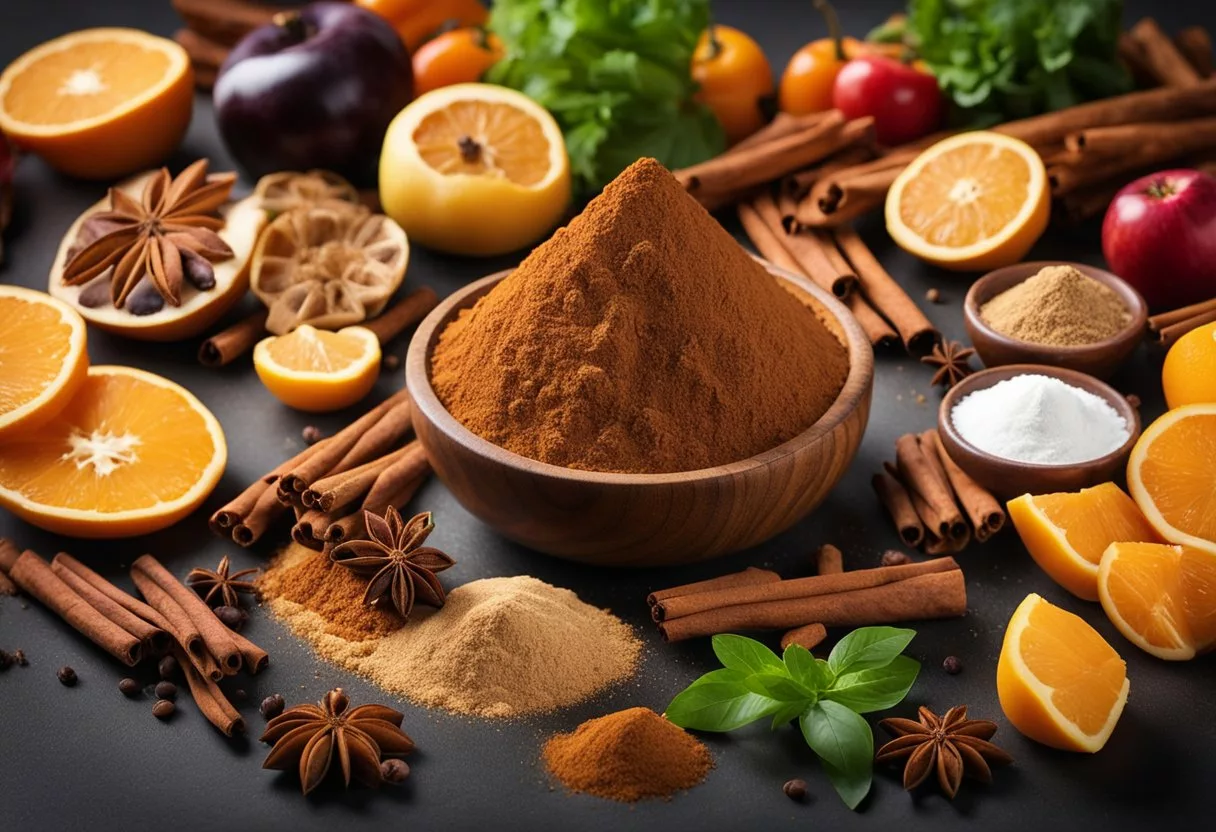Cinnamon is a popular spice that is used in many dishes and desserts worldwide. It is derived from the bark of cinnamon trees and has a warm, sweet, and slightly spicy flavor. In addition to its culinary uses, cinnamon has been used for its medicinal properties for thousands of years.
Many people wonder what happens to their body if they eat cinnamon every day. While cinnamon has been shown to have some health benefits, including potentially lowering cholesterol and blood sugar levels, there are also potential side effects to consider. It is important to understand both the benefits and risks associated with consuming cinnamon regularly to make an informed decision about incorporating it into your diet.
Overview of Cinnamon

Cinnamon is a spice that is widely used in cooking and baking. It comes from the bark of trees in the Cinnamomum family. There are two main types of cinnamon: Ceylon cinnamon and Cassia cinnamon.
Types of Cinnamon
Ceylon cinnamon, also known as “true cinnamon,” is native to Sri Lanka. It has a mild, sweet flavor and is more expensive than Cassia cinnamon. Cassia cinnamon, on the other hand, is more commonly found in grocery stores and has a stronger, more pungent flavor.
Cinnamon Nutrition
Cinnamon is low in calories and contains small amounts of vitamins and minerals. According to WebMD, “Cinnamon is a good source of manganese, fiber, iron, and calcium.” It also has antioxidant properties and may have anti-inflammatory effects. However, more research is needed to fully understand the health benefits of cinnamon.
When consuming cinnamon, it’s important to note that Cassia cinnamon contains higher levels of coumarin, a substance that can cause liver damage in large amounts. Ceylon cinnamon, on the other hand, has lower levels of coumarin and is considered safer for regular consumption.
In summary, cinnamon is a popular spice that comes in two main types: Ceylon cinnamon and Cassia cinnamon. While it contains small amounts of vitamins and minerals, more research is needed to fully understand its potential health benefits. When consuming cinnamon, it’s important to choose the right type and consume it in moderation.
Health Benefits of Cinnamon

Cinnamon is a spice that has been used for centuries for its flavor and medicinal properties. It is known to have several health benefits, including blood sugar control, heart health, anti-inflammatory effects, antioxidant properties, and brain health.
Blood Sugar Control
Cinnamon has been found to improve blood sugar control in people with type 2 diabetes. A study published in the Journal of Medicinal Food found that consuming cinnamon for 12 weeks reduced fasting blood glucose levels and improved insulin sensitivity. Cinnamon contains a compound called cinnamaldehyde, which is believed to be responsible for its blood sugar-lowering effects.
Heart Health
Cinnamon has been shown to have several heart-healthy benefits. It can lower cholesterol levels, triglycerides, and blood pressure, all of which are risk factors for heart disease. A review of 18 studies found that cinnamon can lower total cholesterol, LDL cholesterol, and triglyceride levels. It is also believed to have anti-inflammatory effects, which can protect against heart disease.
Anti-Inflammatory Effects
Cinnamon has anti-inflammatory properties that can help reduce inflammation in the body. Chronic inflammation is linked to several health conditions, including heart disease, cancer, and Alzheimer’s disease. Cinnamon contains compounds that can help reduce inflammation and protect against these diseases.
Antioxidant Properties
Cinnamon is a rich source of antioxidants, which can protect against oxidative damage caused by free radicals. Free radicals are unstable molecules that can damage cells and contribute to aging and disease. Cinnamon contains several compounds that act as antioxidants, including polyphenols and flavonoids.
Brain Health
Cinnamon has been found to have several benefits for brain health. It can improve cognitive function and memory, and protect against Alzheimer’s disease. A study published in the Journal of Alzheimer’s Disease found that consuming cinnamon extract improved cognitive function in people with Alzheimer’s disease. Cinnamon may also protect against age-related cognitive decline.
In conclusion, cinnamon has several health benefits, including blood sugar control, heart health, anti-inflammatory effects, antioxidant properties, and brain health. It is a versatile spice that can be added to a variety of foods and beverages to enhance their flavor and provide health benefits.
Cinnamon in Diet

Cinnamon is a versatile spice that can be easily integrated into meals and beverages. Here are some ways to incorporate cinnamon into your daily diet:
Integrating Cinnamon into Meals
- Oatmeal: Add a teaspoon of cinnamon powder to your oatmeal for a warm and comforting breakfast. Cinnamon not only adds flavor, but also provides fiber and other health benefits.
- Sweet potatoes: Sprinkle cinnamon powder on roasted sweet potatoes for a delicious and nutritious side dish. Cinnamon can also help regulate blood sugar levels.
- Toast: Spread some cinnamon butter on your toast for a quick and easy breakfast. You can make cinnamon butter by mixing softened butter with cinnamon powder and a little bit of honey.
- Baking: Use cinnamon powder in your baking recipes for a warm and aromatic flavor. Cinnamon rolls and other cinnamon desserts are popular choices.
- Recipes: Look up recipes that feature cinnamon as a key ingredient. For example, cinnamon chicken is a savory and flavorful dish that is easy to make.
Cinnamon-Infused Beverages
- Tea: Brew cinnamon tea by steeping cinnamon sticks in hot water. Cinnamon tea has a sweet and spicy flavor and can be enjoyed hot or cold.
- Coffee: Add a pinch of cinnamon powder to your coffee grounds before brewing for a delicious and aromatic cup of coffee.
- Cinnamon tea: Mix cinnamon powder with hot water and a little bit of honey for a soothing and healthy beverage. Cinnamon tea is known to have calcium and other health benefits.
Overall, cinnamon is a great spice to add to your diet. It can be used in a variety of ways and has many health benefits. Just be sure to use cinnamon in moderation, as too much can be harmful.
Potential Risks and Side Effects
Coumarin Content and Liver Health
Cinnamon is a rich source of coumarin, a compound that can cause liver damage when consumed in large amounts. According to a study published in the Journal of Agriculture and Food Chemistry, the coumarin content of cinnamon varies widely depending on the species of cinnamon used. For example, Cassia cinnamon contains higher levels of coumarin than Ceylon cinnamon.
The European Food Safety Authority (EFSA) has set a tolerable daily intake (TDI) for coumarin at 0.1 milligrams per kilogram of body weight. This means that someone who weighs 70 kilograms should not consume more than 7 milligrams of coumarin per day. Consuming more than this amount can increase the risk of liver damage.
Interactions with Medications
Cinnamon may interact with certain medications, including those used to treat diabetes and blood clotting disorders. According to a study published in the Journal of Diabetes Science and Technology, cinnamon can enhance the effects of insulin and improve blood glucose levels in people with type 2 diabetes. However, this can also increase the risk of hypoglycemia, or low blood sugar levels.
Cinnamon can also interact with blood-thinning medications, such as warfarin, and increase the risk of bleeding. Therefore, it is important to talk to a doctor before consuming cinnamon supplements if you are taking any medications.
Allergic Reactions and Toxicity
Cinnamon can cause allergic reactions in some people, particularly those with allergies to other members of the laurel family, such as bay leaves and avocado. Symptoms of an allergic reaction to cinnamon can include itching, hives, and difficulty breathing.
In rare cases, consuming large amounts of cinnamon can also cause toxicity, leading to symptoms such as diarrhea, vomiting, and liver disease. Therefore, it is important to consume cinnamon in moderation and follow the recommended dosage guidelines.
Overall, while cinnamon has been shown to have antibacterial and antifungal properties, and may have benefits for blood glucose levels and insulin resistance, it is important to be aware of the potential risks and side effects associated with its consumption. Anyone with health conditions or concerns should talk to a doctor before using cinnamon supplements. Additionally, maintaining good oral hygiene is important to prevent tooth decay, even if cinnamon is consumed regularly.
Recommendations for Consumption

Dosage and Moderation
When it comes to consuming cinnamon, moderation is key. According to WebMD, the recommended daily intake of cinnamon is no more than 1 teaspoon per day, which is equivalent to 2 to 4 grams of cinnamon powder. Consuming more than this amount may lead to adverse effects, such as liver damage and mouth sores.
It is important to note that cinnamon supplements are not regulated by the European Food Safety Authority, and their safety and efficacy are not guaranteed. Therefore, it is recommended to stick to consuming cinnamon in its natural form, such as sprinkling cinnamon powder on oatmeal or adding it to coffee.
Consultation with Healthcare Providers
Individuals with health conditions, such as diabetes and liver disease, should consult their healthcare providers before consuming cinnamon on a regular basis. Cinnamon may interact with certain medications, such as blood thinners, and may lower blood sugar levels, which can be dangerous for individuals with diabetes.
Additionally, it is important to note that the “cinnamon challenge,” which involves consuming a large amount of cinnamon powder without water, is not recommended and can lead to serious health risks, such as choking and lung damage.
Consuming cinnamon in moderation and in its natural form is safe for most individuals. However, it is important to consult with a healthcare provider before consuming cinnamon on a regular basis, especially if you have any health conditions or are taking medications that may interact with cinnamon.
Cinnamon’s Role in Traditional and Modern Medicine

Historical Uses of Cinnamon
Cinnamon has been used for centuries in traditional medicine to treat various ailments. Ayurvedic practitioners recognized its warming nature, which made it a valuable ingredient for balancing the body’s doshas, particularly Vata and Kapha. Cinnamon was employed to aid digestion, alleviate respiratory ailments, and address menstrual discomfort. In traditional Chinese medicine, cinnamon was used to treat colds, nausea, and diarrhea.
Contemporary Research and Findings
Cinnamon has gained popularity in modern medicine due to its potential health benefits. Research suggests that cinnamon has the potential to aid in the treatment of everything from heart disease to diabetes. Cinnamon packs an antioxidant punch and is rich in polyphenols. According to a study published in the Journal of Medicinal Food, cinnamon can reduce oxidative stress and inflammation in the body.
Cinnamon could lower triglycerides and total cholesterol levels, which could help prevent heart disease. If taken as supplements with at least 1.5 grams of cinnamon a day, it may lower blood sugar levels and improve insulin sensitivity in individuals with type 2 diabetes. Cinnamon also has antibacterial properties that may help fight infections.
However, it is important to note that consuming large doses of cinnamon can have adverse effects, such as interfering with certain medications and causing gastrointestinal problems. Therefore, it is crucial to consult with a healthcare provider before incorporating cinnamon into your diet as a supplement.
In conclusion, cinnamon has been used for centuries in traditional medicine and has gained popularity in modern medicine due to its potential health benefits. While more research is needed to fully understand its effects, cinnamon could potentially aid in the treatment of heart disease, type 2 diabetes, cancer, and gut health due to its anti-inflammatory, antioxidant, and antibacterial properties.